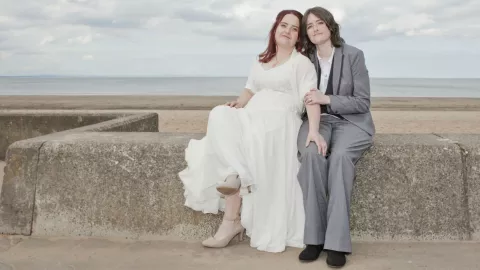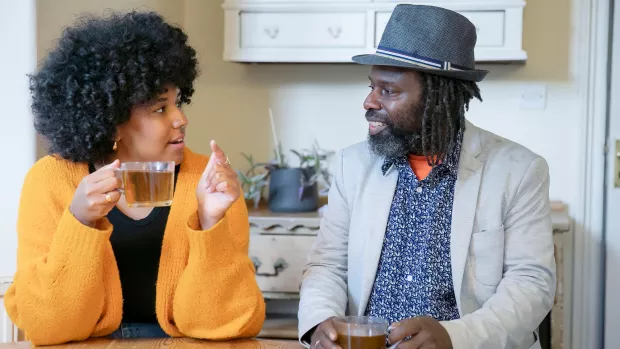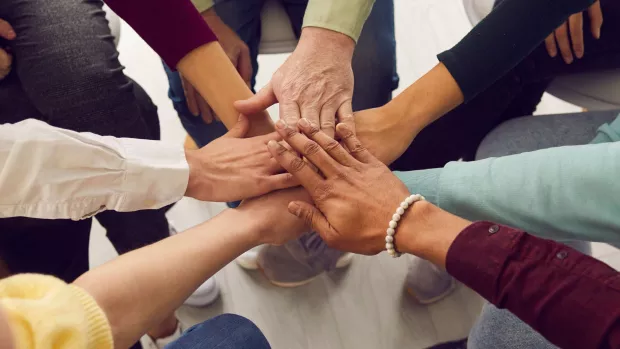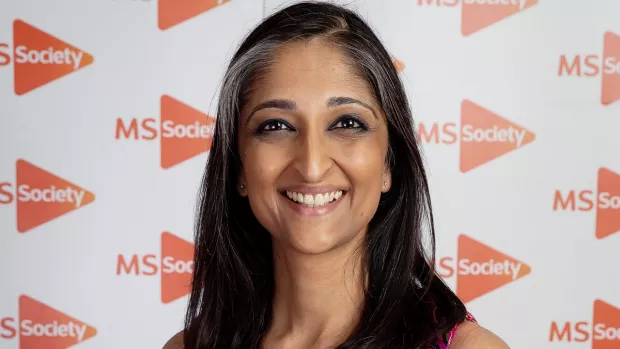
“Every day I get to make sure the person I love gets to be happy”
Sarah’s wife Karine was diagnosed with primary progressive MS in 2013. Sarah shares her and Karine’s MS journey and her own experience of being both a wife and a carer and taking part in co-production.
I met Karine on our first day at university in 2003. I got up the courage to speak with her while we were waiting to get into our introductory class. She promptly went and sat somewhere else once in the classroom. I still tease her about this almost 20 years later.
While I can confidently say it wasn’t love at first sight, there was definitely something there and I kept throwing out an olive branch and trying to make friends with her. That would have been in September 2003 and by late October we were pretty inseparable. Our friends would tease us and people who didn’t know us just assumed we were in a relationship, which caused some confusion along the way as Karine didn’t know I was gay and assumed that she was straight.
Honest conversations
After that unconventional start, I got up the courage to ask her out via MSN messenger on Christmas day 2003 and to this date it’s the best decision I’ve ever made. That’s not to say things have been plain sailing - there have been some bumps along the way. But we’ve found (as corny as it sounds) that talking truthfully to each other has always been the best way to smooth out those bumps.
So in 2013 while I was training for a triathlon and Karine was learning to walk with a stick and denying anything was wrong, it was a frank conversation that finally convinced her to see a doctor. That was the beginning of our MS journey, and I really do mean our MS journey.
Karine’s MS diagnosis
When Karine was diagnosed with primary progressive MS, initially we were thankful that this would give us time to adjust to things as they happened, rather than waking up one morning with a new symptom. It has given me the time to figure out how to best care for her, whether it was learning to use a functional electrical stimulation (FES) device, adjusting to walking aids or now to being a wheelchair mechanic (at this point I’m pretty good one-person pit crew if I say so myself)!
Navigating people’s assumptions
One of the difficulties we have with me being both carer and wife to Karine isn’t how we see each other or interact, but the outside world assuming that I’m only Karine’s carer. I’m happy to identify myself as Karine’s carer now, but doctors etc. are often thrown when first meet them. Now we just try to be very clear with everyone and introduce ourselves as wife and wife.
Getting involved in co-production
Since day one we chose to use Karine’s diagnosis to help others. So it was a very easy decision when we were asked to help co-produce information and support for newly diagnosed people and their family members. In co-production people like us are fully involved in every stage of a project.
We work as a team with volunteers and staff and the knowledge we bring is welcomed. We feel that the outcome is something which is more useful to people with MS or those caring for them because it is produced by people living it- the experts by experience. Our favorite way to get involved is with coproduction because we are treated as equals.
If you had asked me 20 years ago where I saw us in the future, this definitely wouldn’t be it. But I can honestly say I wouldn’t want to be anywhere else. Every day I get to make sure the person I love more than anything gets to be happy and really, I couldn’t ask for anymore.
Do you have MS or care for someone who does? Could you share your experience, knowledge and skills to help shape services for people like you? Our experts by experience newsletter lists all the opportunities to help shape our work.



